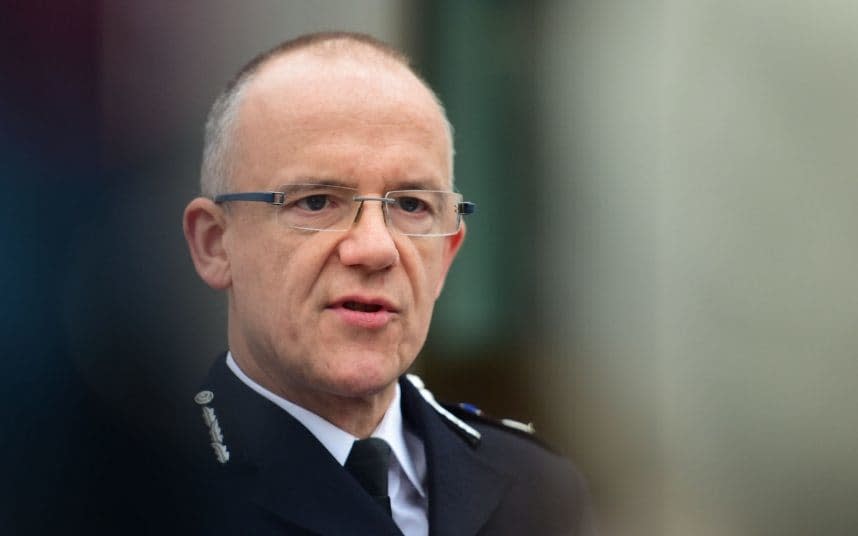NHS not doing enough to help police prevent terror attacks, warns Met's counterterrorism chief

Doctors and health workers are not doing enough to help police prevent terror attacks by mentally ill people who are targeted by extremist recruiters, the Met’s counterterrorism chief has warned.
Since the 2011 Prevent Review all NHS bodies must train staff to spot the signs of radicalisation and report people they fear are at risk of becoming terrorists to the security services.
However an investigation by the BMJ found that between 2015 and 2016, there were just 75 referrals by 59 acute trusts in England. Metropolitan Police assistant commissioner Mark Rowley, the national lead for counter terrorism, said that out of 13 major attacks foiled by Scotland Yard since 2013, ‘a disproportionate number’ of those involved people with mental health issues.
Yet he claims a lack of trust between the NHS and the police is stopping crucial information from being shared.
“The risk is not simply about the mental health condition but is about somebody else revving them up and trying to exploit it,” he said. “However good the mental health professional is, the mental health team on its own is probably insufficient.
“We have to work together, and it requires a bit more trust and collaboration between us.
“If we don’t intervene soon enough, that victim becomes a very serious perpetrator, and if they are about to go and kill people we then have to intervene with a different hat on and prosecute people.
“If we are willing to share information and work together then we can keep this as a preventive response, which is what we all believe in. Waiting for people to try to commit serious offences then putting them in prison for ever is not as elegant a solution.”

Ass Com Rowley said their had been a shift in the nature of terrorist attacks. While past atrocities were carried out by networks of terror cells affiliated to Al Qaeda or the IRA, now lone attacks are perpetrated by the vulnerable or mentally ill.
“We have wrestled with terrorism in the UK for at least 50 years, but for most of that time—whether it was the IRA or Al Qaeda—there were secret networks planning attacks, and the sort of people they recruited had to be highly trustworthy and reliable,” he added.
“Radicalising and inciting someone who is vulnerable to go and carry out some ghastly attack seems to be part of their tactics, and that has brought in a whole load of vulnerability issues, including mental health, that we now have to wrestle with.2
The BMJ investigation found that mental health trusts were better at referring patients of concern, with 245 people reported to the security services between 2015 and 2016.
But the data also showed that many NHS staff have been left ill-prepared to deal with the Prevent programme.
At the worst end of the scale, just 4.5 per cent of staff at St George's University Hospitals NHS Foundation Trust, south west London, had been trained to spot radicalised patients, compared to 94 per cent at Barts Health NHS Trust, east London.

Charlotte Heath-Kelly, associate professor of politics and international studies at the University of Warwick, said medical staff were often confused by their training.
“It tries to impart this idea that you have a duty to report anything you find dangerous or suspect, but it doesn’t tell you how you know something is dangerous or suspect.
“There are vague statements about social exclusion and changes in behaviour, but that could be all teenagers ever.”
Other doctors argue that the strategy unfairly targets Muslims.
Manchester general practitioner Siema Iqbal said: “The strategy is Islamaphobic. It targets specific communities.
“Here, the patient is not the priority, it’s the state. I work in an inner city area where there is a high ethnic diversity and many asylum seekers. I worry that my patients are not disclosing to me everything that they should. A GP’s room should be a safe space, and patients should be able to talk about anything.”
Doctors often feel bound by confidentiality when patients disclose worrying tendencies, even though the General Medical Council recently changed guidance to e make it clear that in certain circumstances such as assisting in the prevention, detection or prosecution of serious crime, doctors are "justified in disclosing information about patients in the public interest."
Medical staff have also criticised Prevent for its lack of transparency about patients who have been referred.
The Royal College of Psychiatrists
has also questioned the ‘variable quality of the evidence’ underpinning the Prevent strategy and has called for it to be published in full.
“The problem at the moment is that we simply don’t know a lot about what happens to people who get referred,” added Adrian James of the RCOP.
Ass Com Rowley admitted there needs to be more transparency and promised that the police would give better feedback to medical staff on the outcomes of their referrals.
"This is new and dynamic and we are going to have to learn together," he added.
“We are still learning the best way to deal with it. With such a new and changing field it is not surprising that we haven’t got 20 years of peer reviews and published research, because the IRA and Al Qaeda didn’t work like this.”

 Yahoo News
Yahoo News 
